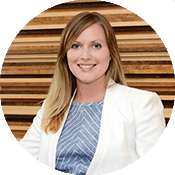- March 01, 2016
- By Natalie Koltun
Maryland doctoral student Jenny Albro’s big ambitions for young readers began with Pinkalicious and Miss Nelson.
While teaching third-graders in Kansas City, Mo., she lent her favorite picture books (with their whimsical princess and tricky teacher) to a student who loved math but struggled with reading. By the end of the year, with the help of the girl’s mother and sister, she was reading on grade level.
That experience stuck with Albro, who soon founded the nonprofit Pages & Chapters to support students from high-poverty schools who face challenges in reading, writing, speaking and listening. It provides strategies and supplies for parents—from phonics flash cards and vocabulary games to comprehension question suggestions—and workshops that bring them together with teachers, and of course, books for children.
 She’s expanded the effort to D.C. and online, and was honored as one of the International Literacy Association’s “30 Under 30” list of global literacy pioneers of 2015.
She’s expanded the effort to D.C. and online, and was honored as one of the International Literacy Association’s “30 Under 30” list of global literacy pioneers of 2015.
The work of Pages & Chapters is based on a discovery she made during her first year of teaching: “In order to learn science and social studies content, my third-graders needed to be able to read.”
The Indiana native discovered her passion for teaching during her senior year of high school while interning in a kindergarten classroom. Aside from gaining invaluable experience, the most rewarding part was seeing her students’ faces light up when they mastered a new concept.
She graduated from Johnson University in Tennessee, then earned a master’s degree in holistic education from Johnson and a second master’s in reading education from the University of Missouri-Kansas City, where she taught second and third grades at an urban charter school. While launching Pages & Chapters there, Albro tutored small groups of students as a reading interventionist. Now, she’s in her second year at UMD pursuing a doctorate in literacy education.
She’s found that students whose learning was limited to the classroom quickly fell behind their peers, so her nonprofit emphasizes parent engagement in children’s education through a series of after-school family workshops.
At each workshop, parents work directly with their child on one of the National Reading Panel’s five essential components of literacy: fluency, phonemic awareness, phonics, vocabulary and comprehension. A teacher then guides parents and kids in activities and reading strategies related to that month’s component while tracking students’ progress. After each session, every child picks a book, donated by Barnes & Noble or community members through holiday book drives, to read with his or her family before next month’s workshop.
The workshops typically accommodate 10 to 15 families at a time in six monthly sessions. Teachers can customize the curriculum to fit their students’ needs and talk with parents about strategies for improvement. The program is in four schools in Kansas City and recently expanded to C.W. Harris and Ludlow-Taylor elementary schools in D.C.
“Fifteen minutes at parent-teacher conferences just isn’t enough. Focusing on families and empowering parents to play a role in their kid’s learning—that’s where the power is,” says Rachael Yeager, a first-grade teacher and workshop director at Ludlow-Taylor. “After leaving the sessions, they have a greater understanding for why these skills are so important and how to get their student up to speed.”
Not only has Albro measured improved literacy scores among the program’s participants, but she’s also noted a shift in their behaviors and attitudes toward reading. Her students often report that they read more frequently with their families—and enjoyed that reading—than they did before starting the program, she says.
